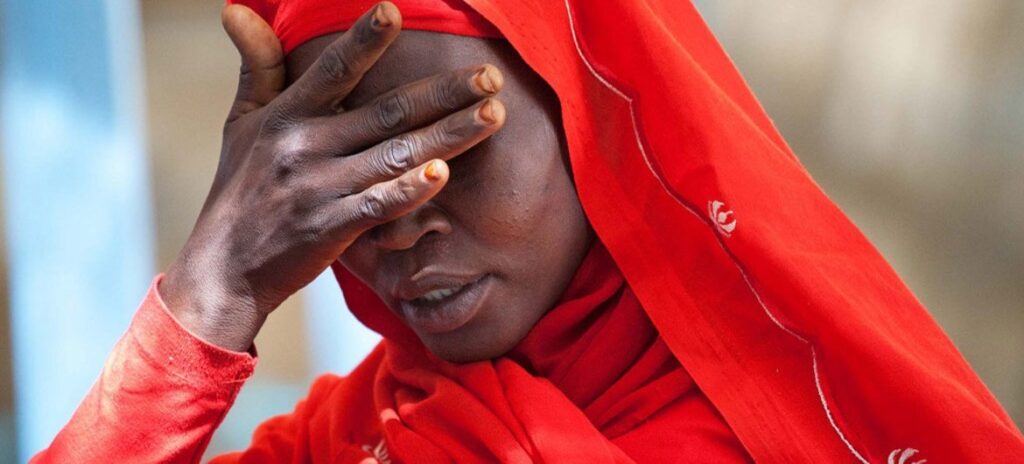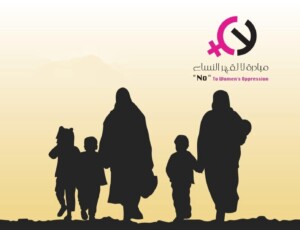Sudan Media Forum: ‘Displaced mothers face rising miscarriages as conflict collapses healthcare’

A woman from the Kassab camp in Kutum, North Darfur, shows her sorrow arohnd the increase of rapes in the area (File photo: Albert González Farran / UNAMID)
Sudan Media Forum – Joint Editorial Room
Compiled by Siddig El Dukhri of Mashaweer News
Pregnant women and mothers fleeing conflict in South and West Kordofan are facing catastrophic health conditions, with alarming rates of miscarriages, malnutrition, and death reported along displacement routes and in overwhelmed hospitals, according to testimonies gathered by Mashaweer News.
Since the outbreak of fighting between the Sudanese Armed Forces (SAF) and the paramilitary Rapid Support Forces (RSF), Kordofan’s southern regions have been transformed into a warzone, triggering successive waves of mass displacement. Women and children have borne the brunt.
Many of those fleeing travel on foot for three to four nights, with little food, water, or access to shelter. “Hundreds of displaced women are suffering severely,” said Safiya El Obeid, a resident of En Nuhoud in West Kordofan. “There are several deaths recorded among women due to malnutrition, poisoning, dengue fever and typhoid, along with complications of childbirth and abortions.”
El Obeid described the scale of collapse in the healthcare system after RSF forces took control of her city. “The situation worsened in an unprecedented way after the invasion of the Rapid Support Forces. The health sector collapsed due to looting and the displacement of medical cadres,” she said.
“After a month, the health situation in En Nuhoud became catastrophic and tragic. The majority of hospitals stopped working, there was a shortage of medical aids and medicines, and no means to save the lives of pregnant women, especially those with kidney failure and diabetes. There are no safe corridors or ambulances.”
El Obeid added that chronic conditions such as high blood pressure and diabetes are now prevalent among pregnant women, who are also more exposed to strokes. “There is a shortage of medical aids, medicines and health staff, which led to the appearance of diseases in pregnant women.”
‘Miscarriage on the road’
Nawal El Naim fled with her family from the town of El Fula in West Kordofan. “We suffered both matters in the journey of displacement,” she said. “We took a carriage through the villages, then moved by lorry until we reached Abu Haraz, and from there to El Obeid.”
She described a harrowing journey. “Most women in neighbouring villages suffer from chronic diseases. Sometimes we hear women crying, and we can’t help them. It’s heartbreaking and painful.”
El Naim said five women suffered miscarriages during the trip from El Fula to El Obeid due to the absence of health care. “Nursing mothers are also among those most affected by the war. During the journey of displacement they were subjected to several troubles before reaching hospitals.”
‘A painful reality’
A displaced man, not identified for security reasons, recounted driving his pregnant wife from El Ahmar, a locality west of Dibebad in South Kordofan, to the town of Abu Zabad in West Kordofan in search of emergency care.
According to him, armed men in RSF uniform stopped them near the village of Awlad Younis. “They asked us to leave the car and hand over the keys. When they learned my wife was sick, they let us go but only after we replaced our car with a rickshaw at our own expense. They seized our car.”
His wife’s condition deteriorated en route. “She suffered severely from pain and distance. When we reached Abu Zabad and entered the hospital, the doctors decided to perform an abortion and blood transfusion.”
“Women and girls stuck in conflict zones are living a painful reality, facing death due to the collapse of the health system and the depletion of medicines,” he said.
‘I was the sixth abortion case that day’
Another displaced woman, Wisal Mohamed El Sharif, fled from Dibebad, following the SAF’s recapture of the region from RSF forces. “After the increasing violations, our fears of murder, rape and sexual violence increased, so we decided to head to El Obeid,” she told Mashaweer News.
“We didn’t find transport and had to walk for four hours. I arrived exhausted, breathless. The road was full of people fleeing the conflict. Eventually, we found a car that took us.”
At the hospital, El Sharif learned her baby no longer had a pulse. “They said I needed an urgent abortion to stop the bleeding and save my life. I was the sixth abortion case that day. The doctor told me the miscarriage was caused by exhaustion and fear.”
Medical experts warn of ‘worsening toll’
Dr Mubarak El Zubair, a specialist in obstetrics and gynaecology, says the war has had a devastating impact on women across Kordofan. “They are subjected to violations, and the lack of health care has contributed to the increase in abortions due to fear and panic caused by artillery and airstrikes, as well as psychological trauma, frequent displacement and malnutrition.”
“The scarcity of medicine, vitamins, and nutritional supplements, especially those needed in the first trimester, and the absence of necessary vaccinations have led to repeated abortions,” he added.
El Zubair explained that the physical strain of displacement alone can be lethal. “Displacement trips force women to walk long distances with luggage. These factors can cause direct bleeding, high blood pressure, and in some cases, placental separation, resulting in miscarriage.”

The Sudan Media Forum, in collaboration with Mashaweer News and other member institutions, calls for urgent humanitarian intervention in the region to address the rising number of miscarriages and maternal deaths among displaced women.











 and then
and then